- Home
- Hannah Alexander
Hideaway Page 18
Hideaway Read online
Page 18
“Oh? Is the boys’ ranch one of them?”
Austin paused. His expression didn’t change, but Cheyenne picked up on some sudden discomfort. “Not now,” he said softly. “It was at one time, but we had a…a tragedy. We had to part company to keep it from happening again.”
“I’m sorry, Austin. I was told about your wife.”
“You were? By Dane, I imagine.”
“Yes.”
“I doubt you got the whole story.”
“The whole story?” she said gently.
“The kid who killed my wife put Dane in the hospital.”
“He told me.”
“And then when it turned out Dane was the only person who could get this kid off the streets, he wouldn’t do it. Dane Gideon allowed my wife’s killer to go free.” His words fell like hard little pebbles into the silence, each word filled with bitterness.
Ramsay glanced up nervously at his dad.
Austin cleared his throat.
“I’m sorry,” Cheyenne said. “I shouldn’t have brought up the subject.”
Austin was silent for a moment, watching the horse crop grass. “Anyway, I didn’t come out here to dig up old ghosts or blast Dane. Some folks have mentioned I’m living too much in the past. It’s a hard habit to stop.”
“So tell me about the festival.”
He looked relieved. “We’ve got local quilting, wood carving, all kinds of crafts on display and for sale. Red and Bertie Meyer bring goat cheese and pies and little statues she makes out of freshwater clamshells and pebbles. My wife and I helped start the festival about fifteen years ago, soon after Ramsay was born. Linea was always really involved in it, usually won the prize for the best painting.”
“I’m sure no one can take her place in the community.” Cheyenne turned and strolled toward the house. “I’ve heard Bertie remark on what a fine job you’ve done with your son.”
Austin caught up and walked beside her. “He’s a good boy, always has been. He’s been through a lot. The church kept us going, even though I was only a casual attender when Linea was alive. The ladies of the church helped out a lot with Ramsay that first year.”
“That must have been a horrible time.”
“It sticks with a guy, you know? There’s always an empty spot, Ramsay not having a mother. Boys need a woman’s touch in their lives to keep them civil.”
Cheyenne looked up at him. “Ramsay seems very civil to me.”
“You can thank the ladies in our church for that.”
“So the church ladies don’t go out to the ranch anymore?”
“Not after what happened to Linea. We couldn’t take the chance.”
“But there haven’t been any other problems with discipline at the ranch since then?”
He was quiet for a moment. “I can see what you’re getting at, Cheyenne.”
“What’s that?”
“I’m holding a grudge. I’m being spiteful. Other people have told me that, but it wasn’t their wife that was killed.”
She stepped onto the front porch. “I’m just suggesting that maybe, after seven years, the ranch has proven to be a safe place again. The boys might benefit if they felt more a part of the community.” Not that it was any of her business.
“Dane quit taking his boys to our church years ago.”
“You mean after your wife’s death? Do you blame him?”
There was an awkward hesitation. He tipped his hat back on his head and frowned at her. “You’ve been talking to Dane a lot about this, haven’t you?”
“The subject has come up. I’ve become acquainted with Blaze.”
“I guess it sounds like I’m a bigot, but there’s still the issue of vandalism to deal with.”
“I thought no one had caught the culprit.”
“That’s because our sheriff hasn’t been looking in the right place, if you ask—”
“Dad.” Ramsay came around the side of the house. “I’ve got to be at school in ten minutes. We’d better get going.”
Austin checked his watch. “You’re right, we’ve got to get.” He rushed toward the steps, as if relieved to be extricated from a discussion he was sorry he’d started.
“Cheyenne, your water trough has a leak in it,” Ramsay said over his shoulder on his way to the truck. “There’s a bucket in the barn you could use for watering the horse. The grain’s just inside the barn door, and the supplements are beside it, with directions.”
The engine roared to life, and they waved as they pulled out.
“You’re sure you have everything packed?” Dane’s hands squeezed the steering wheel as he and Jinx bumped over the rocky dirt road that led them from the ranch to the highway. “The notebooks Cook gave you, the presents from the boys?”
“I have everything, Dane.” Jinx chuckled, and Dane could hear the tension, the way the chuckle was forced a little too fast and hard.
“I love you, kid, you know that.” Dane pressed the brake at the stop sign and brought the van to a standstill, checking the rearview mirror to make sure no one would pull up behind him. “Blaze and Willy and Jason bugged me all night last night to let them ride along so they could say goodbye.”
“Why didn’t you let them?”
Dane glanced sideways at his red-haired eldest, and fought against the overwhelming rush of emotions. “You think they won’t try to take advantage of the opportunity to see a grown man cry?”
Jinx forced another chuckle. With his coloring, he had always flushed easily, and now Dane could see the color rise up his neck. When it reached his face, his eyes filled, as if there were some connection between the blood flow to his face and the water flow to his tear ducts. “I’m going to miss you. I’ll miss everybody, but you’re the one who’s always been there. I wish you were my dad.”
“Your dad had his own problems. Sometimes that blinds people to reality.”
Jinx brushed the tears from his cheeks as his face turned even redder. “It’s like you’re the dad of my heart, and I had to run away from home to find you.”
Dane swallowed. “That won’t change. You’ve got a home here anytime. It isn’t as if you’ll be so far from us.” He pulled out onto the highway to prevent another awkward goodbye scene—there had already been two back at the ranch with various boys.
“You know you don’t have to go right now,” Dane said. “You could stay at home until school starts.”
“I want to earn the extra money.”
“You could work at the general store.”
“And put old Cecil out of a job? How could I live with myself? Besides, I have a feeling you’ll want to bring in another kid before long.”
Dane nodded. It was a possibility. Clint had told him last week how much difficulty they were having with an influx of kids in their teens who needed a home.
“Just don’t let the new kid share a room with Monte,” Jinx said.
“Why not?”
“Because he snores.”
“Maybe we should stick Monte in the closet.”
“If you do that, Blaze’ll wake him up when he sneaks out the window at night.”
“What do you mean, Blaze sneaks out the window?” Dane had an instant vision of Blaze lighting to the ground and finding Austin Barlow and the sheriff waiting to catch him.
Jinx was silent for a moment. Dane glanced at him, saw him nibbling his lower lip.
“Jinx?”
The kid slumped within the confines of his seat belt. “I saw him do it a couple of times. I followed him once, all the way to the barn to check on the kittens you wouldn’t allow him to keep in the house.”
“But there were other times, when you didn’t follow him?”
“I don’t think Blaze is up to anything, if that’s what you mean.”
“Just because you didn’t catch him doing anything wrong the night you followed him?”
“No. I think he does it because he’s used to having more freedom. You know, he had a lot of responsibility with his dad’s ve
t practice. I think the rules at the ranch rub him the wrong way sometimes.”
“You don’t think he already has plenty of freedom?” Dane asked.
“I didn’t say that’s what I thought. I just remember him muttering about all the rules he had to learn when he came here. I know he’s just sixteen, but a lot of times he acts like an adult.”
“If he’s sneaking out at night, he isn’t acting like an adult,” Dane said.
“Dane, is it really that big a deal?”
Dane didn’t want it to be, but could he afford to overlook this? Blaze wasn’t his only responsibility. Even with Jinx leaving, there were seven other boys who depended on Dane to do the right thing, make the right decisions. If he didn’t, he could lose these kids. He couldn’t let that happen.
Friday afternoon Cheyenne walked the half mile to the Meyers’ to give Red a quick checkup. Although his leg had healed well, he continued to have some heart palpitations that concerned her. But she could not persuade him to go to the clinic in Kimberling City.
After still another argument about the evils of modern medicine, she gave up and went to the garden with Bertie to learn how to weed. Three days ago she had tried to weed her own garden, and had yanked out a row of carrots before she realized what she was doing.
Bertie knelt beside Cheyenne and showed her which of the tender green sprouts would someday grace her kitchen table and which would make her sneeze.
“Bertie, you’ve known Austin Barlow for a lot of years.”
“Most of his life.”
“I don’t suppose you’ve noticed a certain…I don’t know…chip on his shoulder?”
Bertie snorted. “Is there a person alive in the county who ain’t noticed?” She tossed a handful of weeds toward the end of the row of carrots. “He’s an active mayor, I’ll say that for him. Got to admire that in a man who isn’t getting paid for what he does.”
“So the position is just a power thing with him?”
Bertie stretched and glanced around the garden. “It is, but he don’t see it that way. He thinks he’s doing his Christian duty interfering in everybody’s lives.”
Cheyenne picked up some rocks and tossed them out of the garden. “It seems to me people do a lot of things to hurt others, and call it their ‘Christian duty.’”
“I know it seems that way sometimes, but don’t let all the meanness blind you to the truth. For instance, you’re a doctor. You see a whole lot more sick people than most. Still, you don’t think, just because you only see them when they’re sick, it means everybody in the world is sick. It’s just that when a person’s sick, his symptoms draw attention. There’s a lot of healthy Christian people in the world who don’t draw attention to themselves, who just quietly do what they know God wants them to do.”
“So you’re saying Austin is a sick Christian?”
“Austin’s got a lot of fighting to do if he wants to overcome the poison he was born into.”
“Poison?” Cheyenne dashed a sheen of perspiration from her forehead. Gardening wasn’t as easy as it looked.
“See that patch of earth over there underneath that black-walnut tree?” Bertie said. “Know why we didn’t plant anything there?”
“I thought you just wanted to avoid the shade.”
“That ain’t it. That tree puts off some sort of chemical in the ground that poisons the plants that try to grow around it. You plant anything over there, it’ll die. Austin’s daddy was that kind of man. He was poison to his family. Austin grew up going to church and calling himself a Christian just because his folks said he was. His daddy was mean and his mama sharp-tongued, and so Austin grew up thinking that was the way all Christians were supposed to behave—all tight-lipped and disapproving and hating anybody who wasn’t just like them. What poor little Austin learned about true Christianity could fit on the head of one of those nails Red used to fix your trellis beside the porch.”
“But he’s a grown man now. He should know better.”
Bertie shook her head. “A man don’t just automatically learn a lesson he needs to learn, if nobody’s willing to show him the truth. I try to do that by loving him and that boy of his, in spite of the things he does sometimes. He’s trying, Cheyenne.”
Bertie moved on down the row. “I remember one time, when Austin was only about twelve, I saw him out working in the field by our back pasture. He’d taken his shirt off, and there were several nasty red welts laid across his back, like someone would’ve done with a razor strap. Now, I know a child’s got to be disciplined, but some folks go too far.” She shook her head angrily, remembering. “Another time, Red found him hiding out in our tractor shed with half his face black-and-blue, his eye swollen almost completely shut.”
Cheyenne gasped. “What did you do?”
“We brought him in the house and asked if he wanted us to help him tell the police about his dad. We told him there wasn’t no reason for him to be treated like that.”
“Did he agree?”
“Nope. He said that was his daddy, and he just couldn’t do anything like that. He must’ve told his daddy about it, too, because they was real unfriendly to us after that. Even Austin was.”
“But why?”
“Family pride, I guess. It don’t matter, because I think we might’ve done a little good, after all. Anyways, we never saw no more bruises on Austin after that, up to and including the day his daddy died, and we’ve never seen anything on Ramsay that might suggest he’s being abused.”
“Austin brought me a horse this morning.”
“So that was Austin’s truck I saw pulling that horse trailer up toward your house. Don’t that beat all! Why’d he do that?”
Cheyenne explained about Courage.
“Sounds to me like you need to have a talk with Blaze. He’ll know what to do for the horse if anybody does.”
“Austin said he would help keep an eye on him.”
“Oh, he would, would he?” Bertie glanced over her shoulder at Cheyenne. “I’m surprised Austin Barlow could tell a horse from a mule. You know what it looks like to me? Looks like Austin’s more interested in using that horse for an excuse to come out and see you.”
Cheyenne chuckled. “You’re right. I’ll get Blaze to check on Courage.”
Bertie paused from her weeding and looked over at Cheyenne. Approval registered in the deep lines of her face. “Blaze’ll love nursing a horse back to health. That kid knows something about everything. Pity he can’t read.” She bent over again.
“Dane mentioned that.”
“He can calculate weights and doses in his head, but sit him down with the Springfield News Leader, and you’ve got a grumpy teenager on your hands.”
“Dyslexia.”
“What?”
“Dyslexia. It’s a perception problem. I have it.” Cheyenne tossed another handful of weeds to the end of the row.
“So how do you cure Blaze’s problem?”
“You don’t. You teach him to function in spite of it.”
“Who’d do that?” Bertie asked.
“He’d need a tutor, someone who knows how to work with him.”
“You mean somebody who knows what’s going on in his mind?”
“That’s right.”
“Somebody like you, then.”
Cheyenne sighed. “Yes, I guess so. Somebody like me.”
Chapter Nineteen
On Saturday morning the air had lost its chill by the time Dane and Blaze escaped the ranch to haul the heavy trough across the lake on the bass boat. It was the first week of May, and the sun’s rays were warm on Dane’s bare arms. It was turning out to be a beautiful spring and he felt like bursting into song. He couldn’t help wondering how much of that attitude came from the anticipation of seeing Cheyenne Allison again.
He studied the back of Blaze’s head, still thinking about Jinx’s revelation yesterday. His instincts told him to trust Blaze. So did his heart. But experience had taught him not to always depend on his feelings.
<
br /> They were halfway across the lake when Blaze pointed toward Cheyenne’s place. “See him? She’s already got him out.”
Up on the small rise to the house, Cheyenne was leading an emaciated chestnut horse to the pasture just above the boat dock. The animal’s nose plunged to the ground as soon as they reached the first clump of grass. Obviously, Cheyenne had little control over him.
“I hope she knows not to leave him out there too long,” Blaze said.
“I’m sure you’ll tell her.”
“I wonder why Austin gave the horse to her. Does she know anything about them?”
“She said she didn’t, but she acts pretty comfortable with him. She said Ramsay was with Austin when they brought the horse.” Dane hesitated. “I haven’t seen Ramsay around much lately. Did you two have a falling-out?”
Blaze looked around at him. “I think his dad found out we were hanging together and got onto him.”
“Did Ramsay tell you that?”
Blaze shook his head and turned back to look at the horse.
“Blaze.”
“Yeah?”
“What do you do at night when you sneak out the hallway window upstairs?”
Blaze’s expression when he turned back around was almost comical. And very guilty. “You saw me do it?”
“No. You’re lucky you haven’t broken the limbs on that tree—or some of your own limbs.”
“I’m not doing anything wrong, Dane. Honest.”
“Then why sneak out?”
“I like to check on the animals at night, and then I like to sit out on the dock, and if I say something about it you’ll either tell me I can’t go or somebody will need to come with me.”
“You know the rules.”
“But I didn’t do—”
“Three strikes and you’re out.”
“Fine,” Blaze muttered. “That’s just fine.”
“I don’t like it, but you know I can’t make exceptions.”
Blaze cast a resentful glare over his shoulder. “I’m not sure but what you’re just looking for a reason—”
“Stop it. You know better.” That stung.

 Silent Pledge
Silent Pledge Eye of the Storm
Eye of the Storm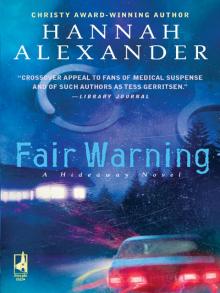 Fair Warning
Fair Warning Double Blind
Double Blind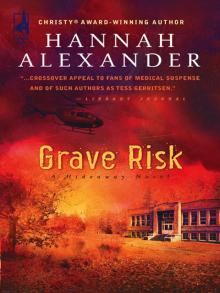 Grave Risk
Grave Risk Hideaway Home
Hideaway Home Death Benefits
Death Benefits Note of Peril
Note of Peril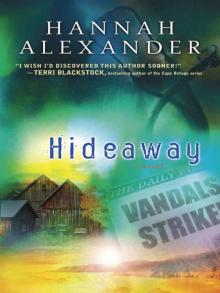 Hideaway
Hideaway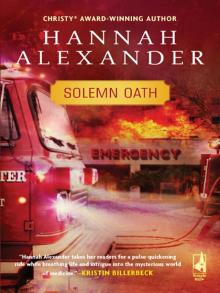 Solemn Oath
Solemn Oath The Wedding Kiss
The Wedding Kiss Last Resort
Last Resort Sacred Trust
Sacred Trust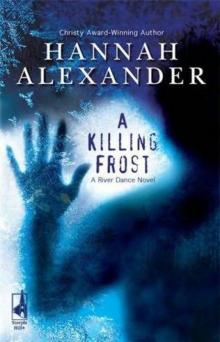 A Killing Frost
A Killing Frost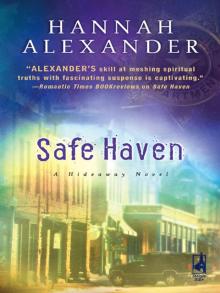 Safe Haven
Safe Haven